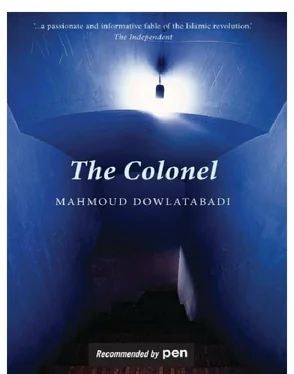Yet he must be able to see the bind I’m in. If the person closest to you can’t see the problems you’re having, what can you expect from anyone else?
He thought that it was nearly time for the dawn call to prayer, but the false dawn had fooled him. The blackness of the night was made even darker by the heavy clouds. The rain beating down on the tin roof rasped his nerves.
Is that Amir? Is that his voice I can hear? Amir… Amir?’
He would have to turn back and go down to the basement. There was nothing else for it. Hearing Amir speak was becoming quite a rare event. This was only the second or third time since Amir had retreated to the basement that the colonel had heard him clearly. Going down the steps to the cellar now, he called Amir’s name once more, this time loud and clear. But he got no answer, no proper answer, just a string of broken syllables, like the noise someone might make who had just been struck dumb. Odd, frightening gargles. the colonel was so distracted that he realised he had forgotten to turn on the light. He reached out for the switch. The basement lit up and he saw his son huddled on the wooden bed with its rumpled sheets, an old army blanket over his head. He was shaking all over and staring blankly into space — his squint even more noticeable now — as if dazed. He was so wrapped up in his own misery that he had not even noticed his father coming in. the colonel stood and looked at him. Sweat was running down his forehead and his long unkempt hair was matted together. He seemed to have been fighting with his demons in a nightmare. His body twitched convulsively as if struggling against terrible forces from another world, against things that were so unspeakable that he could not bring himself to say what they were.
the colonel had to sit down for a minute to rest. He lit a cigarette, pulled up his stool and, sitting with his back to the half-finished bust that Amir was working on, he could see half of Amir’s face. He proffered him the cigarette. He knew that it would be better to get him a glass of water first, but it was too late and Amir snatched the cigarette from the colonel’s hand. As he dragged deeply on it, the colonel noticed that Amir’s lips were as dry and cracked as a flake of bark. Amir held the smoke in his lungs for as long as he could and, when he finally exhaled, it had mingled with his own damp breath and came out like a jet of steam. Neither of them could think of anything to say. So this, then, was his son — a broken man with grey hair sprouting on his forehead, shattered, desperate and ill.
Amir suddenly seemed to come to, but even when awake he could not seem to escape his nightmares. His lips did not move, and neither did his face, but the colonel could hear his voice, a voice that was broken and changed, as if he were conversing with his bones:
“…the madman, that same madman that I once saw in Birjand, the one they called the Caliph. 16No-one knew where he had come from. His face, his eyes, his beard and even the hairs on his temples were dark blue and they said that he would never age and that he had never been any younger than he was now. They said that, to avoid his evil eye, you had to give him alms every time you passed him. They said that a look from him brought a curse and that his breath was poisonous. Yes, that’s right, it was him. He was sitting in a porchway and pissing blood. He was pissing blood into my eyes and I couldn’t shut them. It had run down to the corner of my mouth and in through my clenched teeth. Clotted now, it was blocking my throat and I was choking while I was forced to look at his cock, which he had sliced up with a barber’s razor. I had seen this all with my own eyes when I was a boy. He had painted a face on the tip of his dick and now he was ripping it up with a razor. Then the police came running up. They bundled him into a droshky and carted him off to hospital and we all thought he’d bleed to death. But a week later he was back under the same porchway, sitting on the same charpoy. He’d got himself another razor and was weeping and preparing to mutilate his cock again. He was acting like a man possessed. Now and then, he wiped the snot off his nose with a handkerchief and kept maundering on in a whiny voice. I saw it all myself in my childhood, or maybe in some other childhood, perhaps in a previous incarnation several generations back. But I was seeing it now, and I couldn’t do anything about it and I couldn’t stand it. I was in agony from pain and pus and suffocation and just wanted to die, but… there was worse to come. The Caliph laid his dick on a piece of black stone from an old tomb, got another sharp stone and… ugh! My skull was bursting and I was yelling, but the Caliph kept beating me about the head with his sharp stone until it was all mashed up and I was still screaming and screaming and I pulled at a cord that was round my neck until it was tight round my throat and I couldn’t move, because I was squashed. But I could still feel the Caliph beating and bashing me all over with that piece of stone, which had probably come from a tomb in a cave, trying to break every bone in my body, and my mouth was full of blood and shit and I couldn’t shout, but I could hear the cries coming from the throats of the people in their streets, in their alleyways and in their homes, as they were crushed between those two little pieces of black gravestone. Voices… screams. I had lost so much blood and I had vomited up so much blood that I was fainting. I’m amazed I didn’t die.”
“Ah, colonel, it’s you. I’m not dead, am I?”
“No, not yet, my son.”
the colonel’s reply to his suddenly aged son came from the creaking of his own bones. Sitting there dazed, with his teeth clenched, he seemed incapable of further speech. He was struggling to keep his composure, telling himself that he must not be shocked or surprised by anything, whether it was by Amir not calling him his father or by his disinhibited obscenities. the colonel had begun to think that the strangest things could happen in life, and that mankind had been created to go through life in a string of bizarre experiences, then to die with its eyes wide open in amazement, proud of never having been shocked by anything.
So why should he now be shocked to see his son reduced to this state — his eldest son, who had witnessed his mother’s murder so manfully that he had become almost an accomplice in the deed? Just for a moment it crossed his mind that he should take Amir to hospital, but he dismissed it immediately as pointless. He remembered that the city hospital was overflowing and that the only psychiatrist had gone mad and had been locked up in one of the cells of the Tehran mental asylum, accused of being a spy, and was undergoing ‘re-education.’
He decided to tell Amir the news that his sister had been hanged, thinking that the shock might shake him free him his nightmares. After all, you were supposed to be able to snap people out of shock by giving them another one. It was no fault of the colonel’s that he had never been a psychologist. There were other reasons that prompted the colonel’s decision. It would soon be morning and he had to get on with burying his daughter because, if he hung about any more and did not get back in time, it would be too late and he might lose her. He also thought of taking Amir with him: for one thing, he could do with a hand burying her, plus it would be a good way to get Amir out of the house for some fresh air. More than ever, he was deeply anxious about leaving Amir alone. If he didn’t take Amir along with him, he would not be able to concentrate on the job in hand. He took the plunge:
“Parvaneh has been hanged.”
“Really?”
That was all he said. He just looked at his father, as if frozen. the colonel saw a frightening change come over him, as his whole face took on the expression of an old man now at peace. There was a long silence while the colonel sat quietly, waiting for Amir to react. Amir finally took his eyes off his father’s face and hung his head. Then, as if totally unaffected by the news, as if struggling with a geometry problem:
Читать дальше












